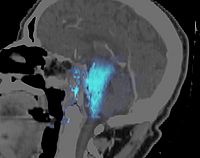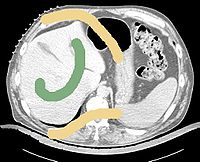Difference between revisions of "Autoseg 2015"
| Line 3: | Line 3: | ||
== Introduction == | == Introduction == | ||
| − | Automatic image segmentation is widely used in biomedical research, and has found use in | + | Automatic image segmentation is widely used in biomedical research, and has found growing use in clinical medicine. Prominent and successful examples include cancer staging, radiotherapy planning, surgical planning, and treatment assessment. However there are many challenges which limit adoption. Segmentation accuracy and reliability still need improvement; many algorithms contain domain-dependent features that cannot be generalized; algorithms must be continuously tuned to match changes in medical practice; and quality assessment methodologies are immature. |
We announce the second Automatic Segmentation Algorithm Workshop (Autoseg 2015), to be held in conjunction with the 2015 World Congress on Medical Physics and Biomedical Engineering (http://wc2015.org) in Toronto Canada. The workshop provides the opportunity for medical imaging researchers to meet and exchange ideas in the rapidly advancing field of automatic segmentation. | We announce the second Automatic Segmentation Algorithm Workshop (Autoseg 2015), to be held in conjunction with the 2015 World Congress on Medical Physics and Biomedical Engineering (http://wc2015.org) in Toronto Canada. The workshop provides the opportunity for medical imaging researchers to meet and exchange ideas in the rapidly advancing field of automatic segmentation. | ||
Revision as of 17:23, 18 December 2014
Home < Autoseg 2015Introduction
Automatic image segmentation is widely used in biomedical research, and has found growing use in clinical medicine. Prominent and successful examples include cancer staging, radiotherapy planning, surgical planning, and treatment assessment. However there are many challenges which limit adoption. Segmentation accuracy and reliability still need improvement; many algorithms contain domain-dependent features that cannot be generalized; algorithms must be continuously tuned to match changes in medical practice; and quality assessment methodologies are immature.
We announce the second Automatic Segmentation Algorithm Workshop (Autoseg 2015), to be held in conjunction with the 2015 World Congress on Medical Physics and Biomedical Engineering (http://wc2015.org) in Toronto Canada. The workshop provides the opportunity for medical imaging researchers to meet and exchange ideas in the rapidly advancing field of automatic segmentation.
Organizing Committee
Stephen Breen, Princess Margaret Cancer Centre
Vladimir Pekar, Philips Healthcare
Gregory Sharp, Massachusetts General Hospital
Venue

Held in conjunction with http://wc2015.org/
June 7, 2015, 8:00-17:00
Metro Toronto Convention Center
Toronto, Canada
Participation
The workshop is free and open to the public. No registration is necessary.
Topics
- Atlas-based segmentation
- Model-based segmentation
- Machine learning methods
- Interactive and hybrid methods
- Algorithm tuning
- Quality assessment
- Other topics

